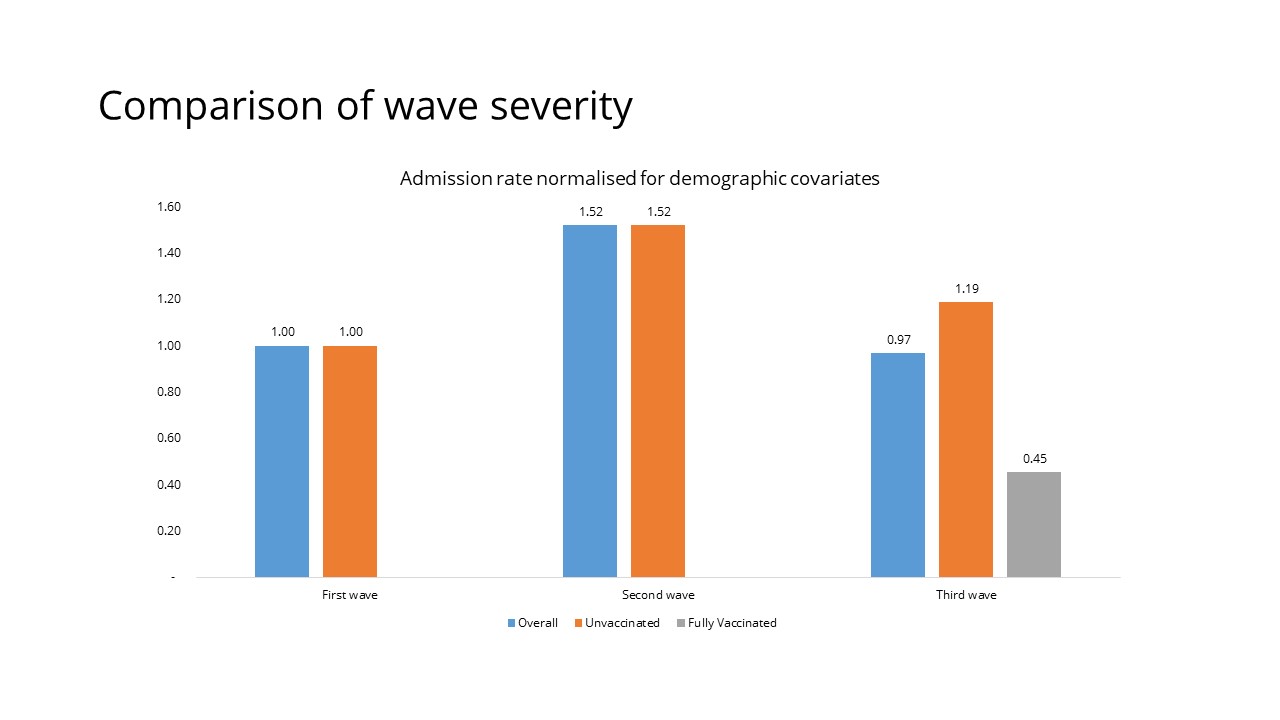Comparing severity of Gauteng's first, second and third waves of COVID-19 infection by investigating hospital admission rates

The highly transmissible Delta variant has driven an exponential rise in COVID-19 cases in South Africa's third wave of infection, and in Gauteng in particular - the province that is the focus of this analysis. Encouragingly, our initial data shows that compared to the second wave of infection, COVID-19 infections in the third wave are not associated with increased risk of hospital admission, which has been influenced by vaccination.
Authors
Shirley Collie (Chief Healthcare Analytics Actuary, Discovery Health), Tommy Chen (Actuary, Discovery Health) and Michael Cohen (Actuarial Analyst, Discovery Health)
From the start of the pandemic in March 2020 to 10 September 2021:
- 36.6% of members of medical schemes administered by Discovery Health had undergone at least one PCR pathology test for COVID-19 and;
- 11.7% of scheme members had tested positive for COVID-19
The majority of scheme members live in Gauteng.
Gauteng's high positivity rate has driven the scale of South Africa's third wave of COVID-19 infection
There has been an exponential rise in confirmed COVID-19 cases in the Gauteng province since 24 May 2021, followed by an exponential decline in cases since Gauteng's peak of infections on 9 July 2021. This province has experienced COVID-19 test positivity rates of above 40%, throughout its third wave, significantly higher than the epidemic control threshold of 5% advised by the World Health Organization (World Health Organization, 2020).
There has also been a parallel increase in the need for hospital admissions to treat scheme members who have developed severe COVID-19 illness during the third wave of infection - a level of demand that is unprecedented for the Gauteng province.
- During the period in question, Discovery Health recorded a rolling seven-day average of 267 daily hospital admissions.
- This can be compared to the peak rolling seven-day average of 175 admissions per day in the country's second wave of COVID-19 infections.
We set out to investigate:
- How the severity of clinical outcomes recorded in the third wave of infection compares to outcomes recorded in prior COVID-19 waves.
- Whether the increased demand for hospital admissions in the third wave is driven by the exponential rise in infection rates or by an increased severity of infection.
- The impact of the vaccine on COVID19 admission risk in the third wave
Our methodology:
The start and end dates selected for each wave (Table 1) for the purposes of this comparison were based on:
- An analysis of the compound growth rate of positive cases per day
- The actual number of medical scheme members (in Gauteng) testing positive for COVID-19 over the period in question.
We compared hospital admissions across the three waves of infection adjusting for observation times post-PCR testing, age, gender and chronicity distribution i.e. disease burden, of positive patients across each wave.
|
Wave number |
Start date |
End date |
|
1 |
24 May 2020 |
15 September 2020 |
|
2 |
20 November 2020 |
7 March 2021 |
|
3 |
18 April 2021 |
5 August 2021* |
*Updated to 5 August based on data available at time of analysis
Our results:
Using hospital admission rates as a proxy for the severity of each wave of infection, it is apparent that (up to 5 August 2021) the severity of the third wave has so far been lower than that documented in the second wave of infection and higher than that recorded in the first wave of infection. The uptake of vaccines has contributed to the third wave appearing less severe. After removing the effect of the vaccine, by comparing admission risk across the unvaccinated population in the different waves of infection, the third wave was more severe than the first but still less severe than the second wave.
The data (Figure 1) show:
- A 55% lower risk of hospitalisation in wave three than in wave two (while unvaccinated lives in wave 3 have a 33% lower risk of hospitalisation)
- A 3% lower risk of admission to hospital in wave three than wave one (while unvaccinated lives have a 19% higher risk of admission)
- Fully vaccinated lives had a 74% lower risk of hospitalisation than unvaccinated lives in wave three.

Figure 1: Relative Risk of admission to hospital for COVID-19 disease during the first, second and third wave of COVID-19 infection in South Africa and across vaccination status
The second wave of infection was driven by the Beta variant, whilst the Delta variant has emerged as dominant in the third wave. The Delta variant, first detected in India, and detected in South Africa in May 2021, is the most transmissible form of the SARS-CoV-2 virus (the virus that causes COVID-19) detected to date on a global level, so spreading far faster (Delta ranges from being 30 to 60% more transmissible) than past variants of concern, Alpha, Beta and Gamma.
In our first report on this data set (published on 29 July 2021), the third wave was analysed up to 10 June 2021 - the day on which the NICD declared the country to be in an official third wave of COVID-19 infection.
At the time infections in Gauteng were on an upward trajectory. Our first data analysis found that the severity of the third wave (measured by hospital admissions) was lower than that of the second wave, but higher than that of the first wave.
From 10 June to-date, data analysis of the remaining days of the third wave shows that vaccinated scheme members contributed to a reduction in overall admission risk over Gauteng's third wave.
The high occupancy rate of ICU hospital beds over the period in question would also have resulted in stricter admissions criteria, likely contributing to a reduction in admission risk relative to the first wave.
Conclusion:
To date we observe a lower hospital admission risk for Gauteng-based medical scheme members contracting COVID-19 relative to the second wave. These results possibly suggest that the Delta variant does not cause higher levels of severe illness (even when the effects of the vaccine are removed), despite being the most transmissible COVID-19 variant to circulate globally thus far.
The results further support that vaccinated lives experience markedly lower severity of illness.
Interested in knowing more or reporting on these findings?
Please contact us on media_relations_team@discovery.co.za to request any updated data available since publication and any further context required.
World Health Organisation. (2020). This province has experienced COVID-19 test positivity rates of above 40%, significantly higher than the epidemic control threshold of 5% advised by the World Health Organization. Retrieved from https://apps.who.int/iris/bitstream/handle/10665/332073/WHO-2019-nCoV-Adjusting_PH_measures-Criteria-2020.1-eng.pdf?sequence=1&isAllowed=y
All information shared on this page is based on perspectives gained from analysing data acquired by Discovery Ltd and its various affiliate entities (Discovery). The analysis, which is conducted by Discovery's actuarial and data science team, aims to encourage industry dialogue. Publications containing our analyses are shared for educational and informational purposes only. Each publication reflects only the data available for analysis at the time of publication. It does not, unless otherwise indicated, constitute peer-reviewed, published scientific research, and hence should not be interpreted as such or used as a basis for altering treatment decisions. While every effort has been made to ensure the accuracy of the content conveyed, we cannot be held liable or responsible for any actions or decisions taken based on the information shared in this article.